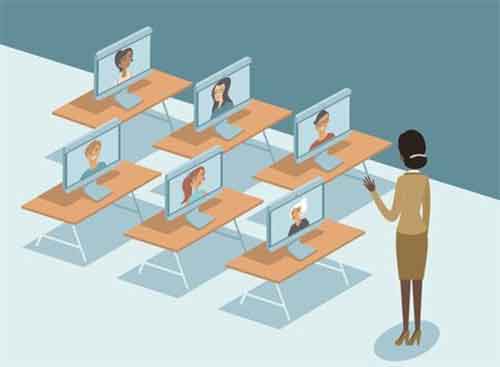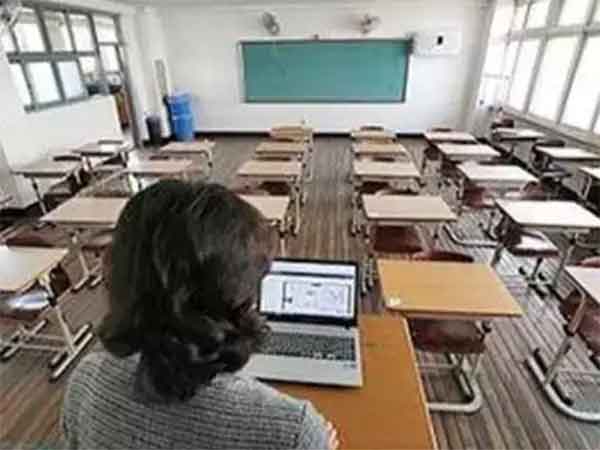
After the announcement of strict lockdown by PM Modi from 24th March 2020, Public Universities, Colleges, and Schools had been completely closed down and supposed to follow the guidelines and advisory issued by Central governments that led to the suspension of classroom teaching in India. Meanwhile, universities and colleges teachers have got instructions from concerned authorities to take online classes, so that student’s academic career cannot be adversely affected during the ongoing pandemic.
However, the question needs to be asked here, will online education or E-learning, is a better substitute for the classroom education in days to come? Secondly, is it feasible and desirable in a deeply hierarchical society (divided into lines of caste, class, gender, and region, etc,) like India to promote online education or E-learning especially where digital literacy among students who are coming from subaltern social and the rural background is extremely low?
According to the survey of the NSS (National Sample Survey) which was conducted in 2017-18, merely 42 percent of urban and only 15 percent of rural households had internet access. In short, on the basis of low digital literacy among poor students and urban vs. rural divide, is it plausible to argue that the very purpose of public education brings out social change should be abandoned? Therefore, it is a time to impart only a kind of education which will prepare the students to acquire a degree and professional skills and maximize individual profits. However, if the purpose of education as defined and underlined by the philosophy of education is to inculcate the idea of public and civic virtues among citizens. In doing so, it will in the long run help to transform and democratize a hierarchical society like India.
In this piece, I will argue that to achieve these egalitarian values (for instance, bridging the gap between poor and rich students and urban-rural divide in terms of getting an education) we need to restore inclusive classroom education. We have to accept that use of the ICT and E-learning can supplement but it cannot be a good substitute for classroom education in days to come.
According to the report of UNESCO (United Nation Educational, Scientific and Children’s Organization) more than 3 hundred million students across the world are out of school after the spread of Covid-19. While reflecting on Indian situations, the UNESCO’s report has underlined that nearly 320 million students in schools and college have been adversely affected after the closedown of educational institutions. In this respect, Director-General of the UNESCO Audre Azoulay sadly expressed said:
“the global scale and speed of the current educational disruption is unparalleled and if prolonged, could threaten the ‘right to education’” (cited by K.S. Venkatachalam, ‘Logging on to the Class’, dated The Hindu Jun 21, 2020, The Magazine, p-2)
The last few months of experiences, amidst COVID-19 lockdown has shown that online education system is relatively beneficial to those students who are coming from the well-off social and economic background and having internet and Smartphone facilities at their homes. But those students who are coming from the lower strata of Indian society (like SC/ST, OBCs, women and minorities) are not able to cope and afford to access online education properly. Simply because of underprivileged backgrounds of students are witnessing huge problems like lack of technological skills, proper training to how can effectively access to digital facilities like internet and Smartphone at their homes. It is to be remembered that India’s ranking is still very low in terms of internet speed. It ranked 128th out of 141 countries in 2020.
It should not be misunderstood here that I am against the positive use of the ICT per se. Besides, most of the schools, colleges and universities have enough space to provide an academic environment for participating in extra-curricular activities such as sports, cultural and literary programmes etc. However, if online education and digitalization of knowledge system will become permanent phenomena to impart education in our country will reproduce further inequalities in a deeply caste-ridden and the unequal socio-economic structure of Indian society. In this respect, academic like Maya John has rightly says,
“Without addressing the marked inequalities in our society and the pro-corporate policies of the state, digital India and its corollary, e-classrooms, will continue to reinforce the hierarchy and segmentation in the education sector, and by extension, reproduce inherited socio-economic inequalities among students” (see Maya John, “Online Education, the Latest Stage of Educational Apartheid” Mainstream Weekly, 13 June 2020, accessed on 24th June 2020)
Earlier experiences and studies (on distance mode and E-learning education) have demonstrated that it had so far not yielded desired results. While underlining the objectives of public education, most of the educationists have had defined education as a ‘public goods’ and must be promoted to inculcate civic virtue and help to shape all-round development of personalities rather than merely seeking profits and material prosperity.
Keeping these broad objectives of education as public goods in mind, the online education system is not a good substitute of the classroom learning. Besides, what is called E-learning/digital education is also exclusionary in nature and will further reproduce inequality and sharpen educational divide at schools, college, and university level. In other words, given the low socio-economic conditions of most of the underprivileged students, if online education becomes permanent phenomena,( as private and cooperate sectors seem to be interested) it will become extremely difficult to access higher education in particular and secondary education in general.
Before coming to discuss the limitations of online education further, let me add anecdote here why the student like me who is coming from remote rural settings (located in Kaimur District of Bihar) and low economic background had attracted and inspired me to pursue higher education. I can say here with a bit of confidence that it was democratic and progressive minded teachers whose thoughtful teachings in the classroom had motivated and in fact helped to develop academic temperament to pursue higher education and do some worthwhile academic works in the future. I had an opportunity to attend the classes of those Professors at the Delhi University and elsewhere who have had earned international and national academic reputations. And they had really inspired me a lot to continue higher education.
Let me take the name of a few teachers who had taught me and encouraged to continue higher education unabated. The list is very long. But let me take a few names here. I had an opportunity to attend the classes during my M.A. (Political Science, 2003-2005 at the DU) of eminent academicians like Professor Manoranjan Mohanty, Prof. Rajeev Bhargava, Prof. Gopal Guru, Prof. M.P. Singh, Prof. Nivedita Menon, Prof. P.K. Dutta, Prof. Veena Kukreja, Prof. Neera Chandhoke, Prof. Achin Vanaik and several others. The purpose of taking the name of these renowned academicians and progressive-minded teachers are that honestly speaking these teachers and their lectures in the classroom had inspired a student like me who had not earlier thought of pursuing higher education in days to come. On the basis of my own experience at the DU and elsewhere in the distant past, I can say with a bit of confidence that the classroom learning (based on inclusive pedagogy and secular values), is having more relevance because it directly influences the minds of students. Classroom education often gives an opportunity for students to have interactions with teachers which help not only sharpen their professional skills to get success in professional life but also shape the academic thinking of students. In other words, classroom teaching, provide opportunities to especially lower caste /class background students who can get chance to interact with a wider audience and transform their thinking from ‘status quo’ to become a critical mass. In addition to that, the classroom teaching based on secular pedagogy will help to prepare a good citizen and develop a sense of ‘civic virtue’ which is very crucial for the survival of vibrant democracy, as reminded by educationalists like John Dewey in his seminal book like Democracy and Education.
Long way back while commenting on pathetic situations of education systems, Dr. D.S. Kothari Commission (1964-66) had reminded that if the education system will not be reformed on democratic and inclusive lines at this crucial juncture, it will produce an army of unemployed youths and create social and educational divides in the future. His crucial points are that we have to provide free and compulsory education up to the secondary level and there should be a common school system while adopting three language formulas. More importantly, for reducing the class inequality, the government must expend at least 6 percent of GDP on education as recommended by the Kothari Commission. However, the sad reality is that his recommendations have had not been entirely accepted by consecutive governments.
Conversely, in the post-liberalization phase-in the name of quality education and getting success in professional lives, large numbers of English medium private schools were opened by private and corporate players especially in urban space that has created further class and educational inequality. As a result of the privatization of education under the garb of the public-private partnership (PPP) and reforming educational the structure has been tremendously increased. Besides, in the name of imparting quality education, numerous new English medium schools were opened especially in the urban settings that led to decline and almost closer to government-funded schools. These trends are gradually now seen in both rural and urban settings. Besides communalization of education(especially history textbooks), the current ruling establishment has more aggressively pushed forward the agenda of privatization of educations at all levels under the grab of public-private partnership model( PPP) and structural reform, as suggested by WTO ( the World Trade Organization) so that private and corporate players could get maximum profits. To demonstrate the point further, Maya John writes,
“ the Government’s recent endeavors allowing the top 100 HEIs to start online courses may appear to many as the opening up of the hallowed realms of quality public-funded education to the impoverished masses” (see Maya John, “Online Education, the Latest Stage of Educational Apartheid” Mainstream Weekly, op., cit).
In short, now education is no longer seen as public goods to bring out social change but to serve the interest of markets and provide service. However, a state like Kerala and its educational experience (due to the presence of the Left Front government) is exceptional in this case. While largely depending upon, state-funded education from school to university education, it has achieved the highest level of literacy (more than 90 percent) and its educational policy somehow reduced class inequality and social divide rather than strengthened it, as happened in the case of northern India. It has to be noted that so far, Kerala has not entirely implemented and provided space to private English medium schools in the post-liberalization phase. It is a fact that Kerala’s budgetary allocations on the educational sector are relatively higher than any other states including economically rich state say for instance like Gujarat from where PM Modi remained as a Chief Minister for more than a decade.
Let come me come back to the point of E-learning and its impact on girls’ students. I have elsewhere argued that during the lockdown, level of domestic violence has increased doubly, as also reminded by the National Commission for Women (NCW) and its Chairperson Rekha Sharma including a section of feminists. In these hostile situations, how can home be a safe place for girl students to get the benefit of E-learning while staying at home? In short, if online education will become permanent phenomena to impart education in the future, as a section of capitalism (mainly by cyber capitalism) and private giants are interested to promote, it will definitely be widened caste/class and gender divide. The point had also been reminded by the Kothari Commission report in the late 1960s.
So the question arises, what are solutions. Whether we have to entirely abandon the classroom education and adopt a completely online education system. Simply because of, it will provide opportunities to all section of students including those students who have so far, not got a chance to study under the formal education. Hence digitalization of education is a good option for India (as seen in some advanced countries) and must be adopted in the society like India. However, the digital divide (for instance, lack of internet facilities and Smartphone for rural poor students) on the one hand and caste/class and gender discriminations confronted by the low caste students on the other will further create an educational and social divide. More importantly girls’ students and lower caste boys who are now increasingly getting enrolled in school educations because of several welfare programmes launched by the government like mid-day meals and scholarships after the Right to education (added in the chapter of Fundamental Rights) in our country.
To conclude, online education can be supplementary, but cannot replace and become an alternative to classroom education as argued by several educationists of our country. However, classroom education should not be an entirely dependent on traditional pattern of delivering education and compromising with quality educations and averse to use of the ICT. Yet, given the digital divide and digital illiteracy on the one hand and patriarchy and casteist nature of our society on the other, if educational institutions will fully dependent on the online education system, it will further create an educational divide. And therefore, lower caste/class background students will be further excluded from fruits of getting educations that have already deprived so far from the mainstream education. Let me end here by saying that online education can be a supplementary, however, it will not be a welcome step to replace the classroom education which has so far provided public space to dismantle ‘status quo’ and develop critical faculties.
The author is a Research Scholar University of Delhi.
SIGN UP FOR COUNTERCURRENTS DAILY NEWSLETTER
















































